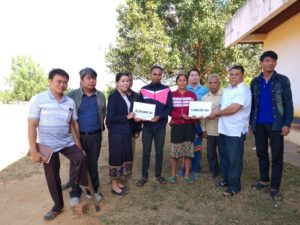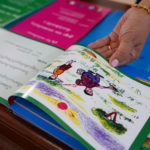
Funded by the United States Department of State, the Lawang (“Beware”): Expanding the Scope of Explosive Ordnance Risk Education (EORE) in Laos project will help ensure that children, youth, and people living in high-risk communities in Laos have the knowledge and skills to keep themselves and their families safe from unexploded ordnance (UXO). The project builds off of the achievements of World Education’s (WEI) previous risk education programs by piloting new modes of EORE that will bring UXO safety messages to a wider audience across the country.
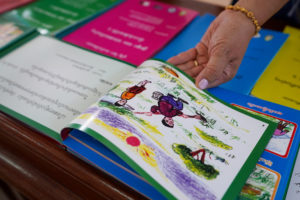 Although the overall number of casualties caused by unexploded ordnance (UXO) accidents have decreased in recent years, accidents still occur regularly and each year, an average of 48% of all reported accidents victims are children or youth. On many occasions, UXO accidents happen while youths play in a field, scrap metal collectors scavenge for parts, farmers tend to agriculture, and villagers light fires to stay warm during the winter. As a result, there is an ongoing need to implement EORE in Laos to raise awareness of the dangers of UXO and promote safer behaviors among high-risk groups. While previous projects have focused on strengthening EORE in primary schools, the Lawang project will partner with the Ministry of Education and Sport (MOES) to target additional at-risk groups through a variety of channels. WEI is currently working with the MOES to finalize the project design.
Although the overall number of casualties caused by unexploded ordnance (UXO) accidents have decreased in recent years, accidents still occur regularly and each year, an average of 48% of all reported accidents victims are children or youth. On many occasions, UXO accidents happen while youths play in a field, scrap metal collectors scavenge for parts, farmers tend to agriculture, and villagers light fires to stay warm during the winter. As a result, there is an ongoing need to implement EORE in Laos to raise awareness of the dangers of UXO and promote safer behaviors among high-risk groups. While previous projects have focused on strengthening EORE in primary schools, the Lawang project will partner with the Ministry of Education and Sport (MOES) to target additional at-risk groups through a variety of channels. WEI is currently working with the MOES to finalize the project design.
- WEI and the Department of General Education will train over 1,300 secondary school teachers on how to use EORE teacher handbooks that were developed under Comprehensive Mine Risk Education project. Following the training, thousands of secondary school students across the country will receive EORE lessons during extracurricular periods. WEI will also work with secondary schools to conduct additional EORE events for their students.
- With the Department of Non-Formal Education, the Lawang project will develop and pilot an EORE curriculum for non-formal education centers to reach young people who have dropped out of the formal education system as well as agricultural workers and other laborers pursuing additional education.
- The Lawang project will partner with village education development committees (VEDCs) to help spread UXO safety messages within at-risk communities. VEDCs will recruit youth volunteers to conduct EORE sessions for other members of their communities.
- WEI, the MOES, and the National Regulatory Authority will work together to develop and disseminate EORE media across a variety of channels, including social media.
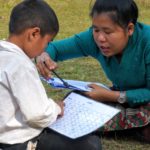
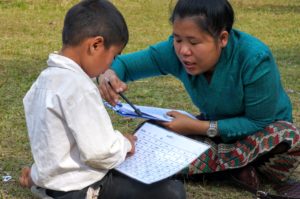
An enumerator from our partner organization gives the EGRA to a student in Luang Namtha province. December 2018.
World Education provides technical advising and project management expertise to build the capacity of a local organization so it is able to lead and effectively monitor the literacy component of the World Food Programme (WFP) Food for Education project in northern Laos. Through workshops, trainings, and coaching, World Education helps the organization conduct Early Grade Reading Assessments (EGRA) and improve its monitoring, evaluation and project management capacity to ensure its ability to carry out activities throughout the duration of its partnership with WFP.
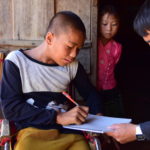

USAID Okard is a five-year project that promotes the independence and functional ability of persons with disabilities through equal access to health and social services in the Lao People’s Democratic Republic. Funded by the U.S. Agency for International Development’s Leahy War Victims Fund and Victims of Torture Program, and the U.S. Department of State, USAID Okard partners with the Lao government and civil society to develop and implement disability inclusive policies so that no one is left behind.
Persons with disabilities are among society’s most marginalized populations. Some of the major causes of disabilities in Laos are unexploded ordnance (UXO), road accidents and increasingly, non- communicable diseases such as Type 2 diabetes and stunting. Equal access to health and social services will foster inclusivity of persons with disabilities in their communities and allow them to contribute more effectively to society.
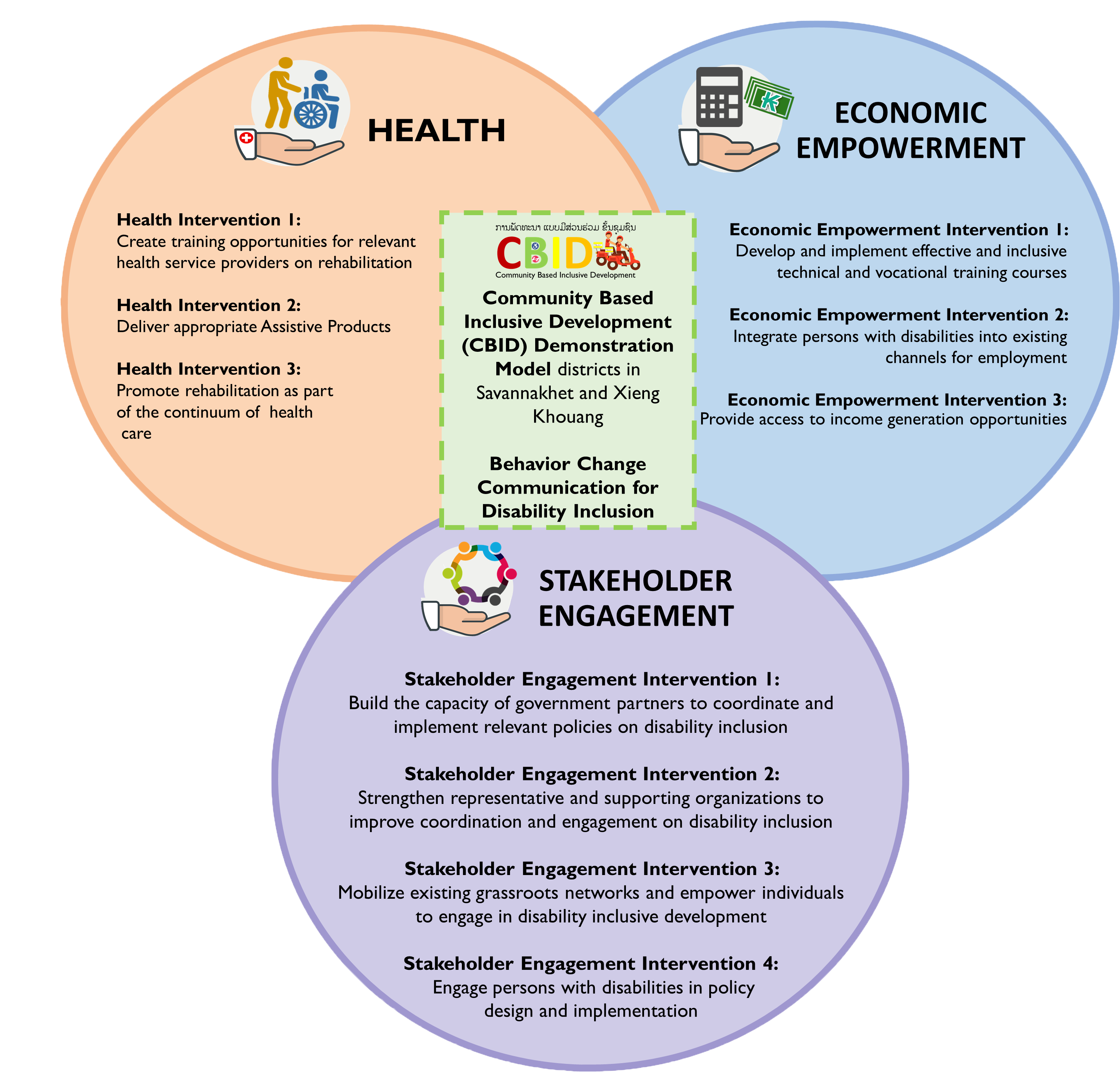
KEY APPROACHES
The U.S. Agency for International Development (USAID) Okard project partners with the public and private sectors to support persons with disabilities in the areas of health, economic empowerment and stakeholder engagement. It uses a systems-centered approach focusing on government ownership of disability inclusive policies and development of physical rehabilitation and mental health and psychosocial support (MHPSS) services for long-term sustainability. The project also applies a person-centered approach addressing the individual needs of persons with disabilities and the communities that support them. The project is primarily implemented in Vientiane Capital and in the provinces of Xieng Khouang and Savannakhet.
USAID Okard directly addresses the health, livelihoods and social needs of persons with disabilities, using an evidence-based model to demonstrate tangible change in communities and the lives of persons with disabilities. This contributes to strengthening government systems and decision-making in support of the National Disability Policy and the National Rehabilitation Strategy.
HEALTH
USAID Okard trains health and rehabilitation service providers, supports health centers to provide assistive products at the local level and promotes rehabilitation as a standard component of healthcare services. It also supports Mental Health and Psychosocial Support (MHPSS) through trainings of service providers, counselor and peer-counseling.
ECONOMIC EMPOWERMENT
The project engages with a variety of partners including non-profit associations, governmental bodies and the private sector to implement inclusive vocational training courses, integrate persons with disabilities into the labor force and provide market-based livelihood opportunities.
STAKEHOLDER ENGAGEMENT
USAID Okard assists the Ministry of Health and the National Committee for Disabled People and the Elderly to better coordinate organizations and institutions that support persons with disabilities. In addition, the project strengthens disabilities-focused organizations’ engagement with the Government of Laos to advance the rights of persons with disabilities, mobilize grassroots networks and engage persons with disabilities in policy design and implementation.
ANTICIPATED OUTCOMES
USAID Okard promotes greater economic self-sufficiency, improved functional ability and the well- being of persons with disabilities and their households, especially those who have mobility limitations. The project works towards creating an environment in which persons with disabilities are empowered to actively participate in society.
- Improved access to health and rehabilitation services for persons with disabilities and their households.
- More persons with disabilities and their households employed or self-employed.
- A more supportive environment for the sustainability of health and economic empowerment improvements.
- Strengthened health systems with rehabilitation and MHPSS included in the continuum of care.
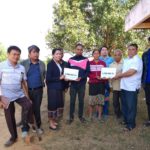
Between 1964 and 1973, more than 240 million cluster bomb sub-munitions were dropped in Laos. 80 million of these bombs failed to explode and continue to pose a hazard to civilians. Since 1964, approximately 20,000 people have been killed or wounded by unexploded ordnance (UXO), many of them in remote and rural areas. Medical treatment, physical rehabilitation, and mental health services are extremely limited throughout Laos, and poor communications and transport networks prevent survivors and their families from accessing services, which are concentrated in provincial capitals.
Since 1996, World Education has supported UXO survivors through administering the War Victims Medical Fund (WVMF), funded by the U.S. government. More than 1,000 UXO survivors have received support from the WVMF for their emergency and ongoing medical costs. Since July 2016, World Education operates the fund in partnership with the National Regulatory Authority, the government agency in charge of UXO issues.
The fund provides essential support to anyone injured by UXO nationwide, covering
- Immediate and ongoing medical care
- Surgery costs
- Dental services
- Assistive devices
- Transportation within Laos
- Accommodation during hospital stay
- Food allowance during hospital stay (including two family members)
- Contribution towards a religious ceremony or funeral
View the WVMF Pamphlet in English or WVMF Pamphlet in Lao for more details.
For more information about accessing the WVMF, contact the NRA hotline at 1603 or World Education at (856-21) 214524.
The WVMF does not cover the cost of other services that enable UXO survivors and their family members to sustain their livelihoods and resume their daily activities. Some victims cannot return to working on the farm and benefit from vocational training to learn a new trade. Children may need additional support to return to school. World Education works with local partners to provide these additional skills and assistance through funds raised by private donations. Please click here to make a donation. After you enter a donation amount, select “Donate to a specific project,” and enter “War Victims Medical Fund, Laos” in the corresponding box.
Watch a video about UXO survivors and the help they have received through World Education:

